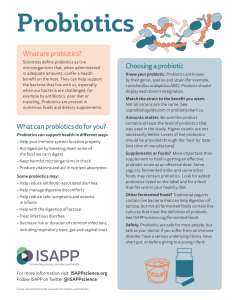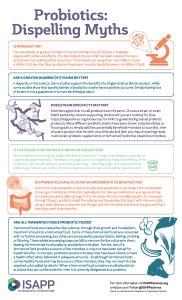What is a probiotic?
Not all friendly live microbes qualify as probiotics. True probiotics are live microorganisms, at a specified dose, that are tested and shown to provide health benefits. Probiotics work in different ways to achieve a health benefit, including interacting with the community of microbes living in your digestive tract, although they typically don’t stick around for long in your gut. Different probiotic strains are present in different products, with each one designed to deliver a particular health benefit.
See here for information on permission to use these ISAPP materials.
ISAPP’s videos feature subtitles in multiple languages. The translations are made possible through the kind assistance of volunteer translators in the ISAPP community.
Here’s how to change the subtitles:
Step 1 – Click on a video and press play.
Step 2 – Press pause and click the gear-like ‘Settings’ icon, to the right of the ‘CC’ icon.
Step 3 – Click on ‘Subtitles’ and select the language subtitle you prefer.
Step 4 – Resume the video by pressing play.
Video Transcript
Probiotics are live microorganisms that have been shown to provide health benefits.
When we consume probiotics, they enter our digestive tract where trillions of other microbes live.
This collection of microbes is called your gut microbiota, and like a fingerprint, no two gut microbiotas are the same.
The vast majority of these microbes help your body function properly, performing a number of beneficial physiological functions.
They help extract vital nutrients from food you can’t digest yourself.
They educate your immune system.
They can improve the integrity of your intestinal barrier.
They even influence your mental health.
When you take a probiotic, you are introducing good bacteria into your digestive tract which can promote these beneficial microbial activities and limit the overgrowth of bad bacteria.
Probiotics interact with our resident microbes, producing health-promoting metabolites as they travel through our gut.
And although probiotics are few in number relative to our gut microbiota, and they typically don’t stick around for long,…
…studies show that probiotics can support digestive health, immune health, and beyond, using many of the same mechanisms that our gut microbiota use.
Probiotics are widely available as supplements and are present in a number of foods, especially some yogurts and fermented milks.
Most often, commercial probiotics are from a few microbial groups, such as the genus Lactobacillus or the genus Bifidobacterium.
Each probiotic should be described by a genus and species name and then even more specifically by a strain designation.
Including probiotics in your daily diet can encourage the activities of the friendly bacteria in your gut.
And may improve several aspects of your health.
If you’re interested in the health benefits that probiotics may provide, check out the ISAPP videos: “Are All Probiotics the Same?” and “Health Benefits of Probiotics.”
And for further questions, helpful guides are available at ISAPPscience.org.
Ask your healthcare provider for probiotic recommendations based on your specific health needs.
Please refer to ISAPPscience.org for additional information, or ask your doctor or healthcare provider.
NOTE: The ISAPP board of directors developed this video to accurately represent current science. Industry had no control over final content.
As a global organization, ISAPP is pleased to make available multiple language translations of key resources. Effort has been made to ensure the accuracy of the translations, but in the event of any discrepancies, the English language version shall be considered primary.



